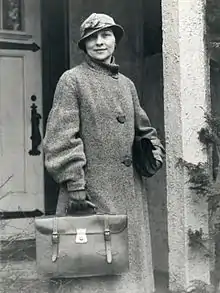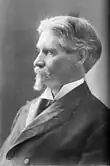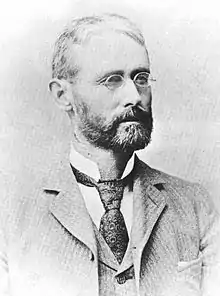Hillsdale College
Hillsdale College is a private, conservative,[3][4] Christian[5] liberal arts college in Hillsdale, Michigan. It was founded in 1844 by members of the Free Will Baptists.[6] Hillsdale's required core curriculum includes courses on the Great Books, the U.S. Constitution, biology, chemistry, and physics.[3]
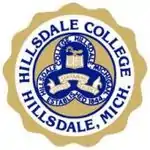 Hillsdale College Seal | |
Former names | Michigan Central College (1844–1855) |
|---|---|
| Motto | Latin: Virtus Tentamine Gaudet |
Motto in English | Strength Rejoices in the Challenge |
| Type | Private liberal arts college |
| Established | December 4, 1844 |
Religious affiliation | Non-denominational Baptist (historical) |
| Endowment | $900 million (2021)[1] |
| President | Larry P. Arnn |
| Provost | Christopher VanOrman |
| Location | , U.S. 41°55′59″N 84°38′01″W |
| Campus | Rural, 400 acres (160 ha) (84 buildings)[2] |
| Colors | Blue & white |
| Nickname | Chargers |
Sporting affiliations | NCAA Division II – GMAC |
| Website | hillsdale |
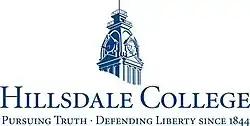 | |
Since the late 20th century, in order to opt out of the US government's Title IX nondiscrimination requirements, Hillsdale has declined government financial support. Instead, Hillsdale depends entirely on private donations to supplement students' tuition.[3][7][8]
History
Founding
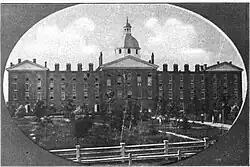
Members of the Free Will Baptist sect founded their denomination's first collegiate institution in 1844.[6]: 4 They established Michigan Central College in Spring Arbor, Michigan, [6]: 6 The state of Michigan incorporated the college in the following year, during which the college enrolled 25 undergraduates.[9]: 12 [10][6]: 11 The college was officially non-sectarian.[11] Its first president was Daniel McBride Graham, who held the office from 1844 to 1848.
Edmund Burke Fairfield assumed the school's presidency in 1848, and in 1850 the college was chartered to confer degrees.[9]: 12–14 [6]: 116 Black students were admitted immediately after the college's founding,[12] and the college became the second school in the nation to grant four-year liberal arts degrees to women.[13][9]: 12–14
Outgrowing its space, in 1853 the school moved to Hillsdale, Michigan, in part to have access to the railroad that served the city. It received financial support from residents who wanted to develop the 20-year-old town.[9]: 30 [14][6]: 24 Construction was completed and the school reopened as Hillsdale College in 1855.
Fairfield led Hillsdale from 1848 to 1869.[10][15] In 1854, he attended the first convention of the new Republican Party with Ransom Dunn in neighboring Jackson, Michigan.[16] Fairfield was elected lieutenant governor of Michigan. Hillsdale's early anti-slavery reputation and pivotal role in founding the Republican Party led to the invitation of several notable speakers on the campus, including Frederick Douglass (who visited the school on two separate occasions) and Edward Everett, the orator preceding Abraham Lincoln at Gettysburg.[9]: xxv, 49 On August 8, 1860, Hillsdale conferred its first degrees. On March 20, 1863, the Michigan legislature formally legalized Hillsdale's change of name and location.[6]: 33
Hillsdale no longer has any denominational affiliation but, according to its website, "the moral tenets of Christianity as commonly understood in the Christian tradition have been essential to the mission of the College".[17] It has always been open to black and female students.[3]
19th century
.jpg.webp)
In 1861, many Hillsdale students joined the ranks of the Union Army during the American Civil War; a higher percentage of Hillsdale students enlisted than from any other Michigan college.[6]: 60 [18][19]: 1
In 1869, James Calder succeeded Fairfield as president. Calder served through 1871. During his administration, the commercial school opened, a theological department was established, and the college enrolled around 750 students.[6]: 73, 292, 411 He resigned to become president of Pennsylvania State University.[10]
Hillsdale's first president, Daniel McBride Graham, returned for a brief second term in 1871, notably rebuilding the campus after the catastrophic "Great Fire" of March 6, 1874.[9]: 139–66 [6]: 77 DeWitt Clinton Durgin, a Union College alumnus, was president from 1874 to 1884.[10] In 1878, the Hillsdale Herald was published, becoming the second oldest college newspaper in Michigan, behind Kalamazoo College's The Index. This paper later merged with another college paper to become The Collegian.[6]: page needed During Durgin's presidency, Hillsdale's Kappa Kappa Gamma and Sigma Chi chapters were chartered.[6]: 462, 464
After Ransom Dunn's brief turn as acting president, George F. Mosher served as president of Hillsdale from 1886 to 1901.[10][20][21][6]: 116, 125 During this time, the college grew in size and prestige. In 1884, Spencer O. Fisher became the first Hillsdale alumnus elected to Congress.[6]: 119 Pi Beta Phi and Alpha Tau Omega were chartered.[6]: 465, 467 In 1891, the Chicago Herald reported, "Hillsdale has a college second in standing to no denominational college in the country." Four years later, when the University of Chicago offered to affiliate with Hillsdale, the college rejected the proposal.[9]: page needed
20th century
| Hillsdale College | |
|---|---|
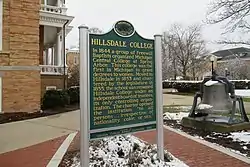 | |
| Location | 33 East College Street Hillsdale, Michigan |
| Coordinates | 41°55′57″N 84°38′02″W |
| Designated | January 16, 1962 |

In 1900, Hillsdale ceased grazing livestock and removed the agrarian fence circling the campus.[22]: xxiii [6]: 135 It began an era of institutional growth and professionalization. In 1902, Joseph William Mauck became the college's sixth president, the first Hillsdale graduate to return as president of his alma mater.[10] Beloved by the college community and an early and outspoken advocate for women's suffrage, Mauck served for two decades.[23][24] One of the women's dormitories is named after Mauck.
In 1907, the college amended its Articles of Association, no longer requiring the president and trustees to be Free Will Baptists. This led to a decline in the theological department's prestige but an increase in the number of Christian denominations represented on campus.[6]: 166 [22]: xxiii
William Gear Spencer succeeded Mauck as president, serving from 1922 to 1932, when he departed to lead Franklin College.[10][25] Under Spencer, Hillsdale acquired its 14-acre Slayton Arboretum, built new dormitories, constructed a new field house for its developing athletic programs, and, in 1924, chartered its chapter of Chi Omega.[22]: 60–69
During the Great Depression, Willfred Otto Mauck, Joseph Mauck's son and also an alumnus, was selected as the eighth president, serving from 1933 to 1942.[10] Throughout this era, the college struggled financially, was forced to cancel its new construction projects, and cut the pay of its faculty and staff by nearly 20%.[22]: 72–83 [6]: 210 Succeeding Mauck, Harvey L. Turner became Hillsdale's ninth president, serving from 1942 to 1952.[10] Despite its financial difficulties, the college built a new library, had an undefeated and untied football team in 1938, and celebrated its centennial in 1944, when more than 1,000 alumni returned to campus for the commencement ceremony.[22]: 113 [6]: 267
J. Donald Phillips next assumed the presidency, holding the position from 1952 to 1971.[10] During his administration, Hillsdale constructed the Simpson and McIntyre Student Residences in 1966.[26] In these years, Hillsdale began to resist federal civil rights regulations, particularly concerning affirmative action, enacted in the 1960's.[22]: 167, 212 [27][28] In 1962, the college's trustees adopted its own "Declaration of Independence". It affirmed Hillsdale's stance against what it called governmental control.[22]: 191
A marker designating the college as a Michigan Historic Site was erected by the Michigan Historical Commission in 1968.[29]
George Roche III became the 11th president of Hillsdale College in 1971. During the Roche years, Hillsdale became nationally known, in part because of its withdrawal from federal and state-assisted loan programs and grants. Colleges that receive federal funding are required by law to report data on racial integration as part of the US affirmative action student loan program. Hillsdale announced that it refused to do so, and the college's trustees instead stated that the institution would follow its own non-discrimination policy and "with the help of God, resist, by all legal means, any encroachments on its independence."[22]: 237–39
During Roche's presidency, the college dramatically increased its endowment, established the Center for Constructive Alternatives, and hosted prominent national speakers, including Ronald Reagan. It also began publishing Imprimis, a monthly speech digest.[10][22]: 222–23 Russell Kirk taught at Hillsdale for one semester per year beginning in 1973.
Roche resigned his position at Hillsdale in late 1999 following a scandal surrounding the death of his son's wife, Lissa Jackson Roche, who committed suicide in the Slayton Arboretum on October 17, 1999. Hours prior to her suicide, Ms. Roche stated that she and her father-in-law had engaged in an on-and-off[30] 19-year sexual affair.[31] Married to Roche's son, Hillsdale Professor of History George Roche IV, Jackson Roche had been employed as managing editor of Hillsdale College Press for 14 years.[32] President Roche denied the alleged affair, but was suspended by the College on November 1 and resigned his post on November 10.[31][33] Due to Jackson Roche's suicide and the ensuing scandal, the college's reputation suffered.[7]
21st century
Larry P. Arnn has served as president of the college since 2000.[34] Hillsdale's K–12 Initiative developed a full liberal arts K–12 curriculum for use in the charter schools and its private school in Michigan, Hillsdale Academy. In 2021, Hillsdale K–12 released a Civics "1776 Curriculum."[35] In 2022, Hillsdale had schools following its K–12 liberal arts curriculum across 19 states and Barney Charter Schools in 9 states.[36]
After several decades of maintaining a semester program in Washington D.C., Hillsdale established a permanent presence with the establishment of the Allan P. Kirby, Jr. Center for Constitutional Studies and Citizenship on Massachusetts Avenue. The facility was dedicated on Constitution Day 2010.[37] Ginni Thomas, wife of Supreme Court Justice Clarence Thomas, ran the Washington center's speaker series at this time.[38] In 2015, the Boyle Radio Studio at the Kirby Center was dedicated.[39]
In 2012, Hillsdale founded the Van Andel Graduate School for Statesmanship on its Michigan campus offering both an M.A. and PhD in Politics. Its first M.A. students graduated in 2014, and its first PhD students graduated in 2018.[40] In 2020, Hillsdale founded the Van Andel Graduate School of Government on its DC campus offering an M.A. in Government.[41] In 2022, Hillsdale founded its Graduate School of Classical Education offering an M.A. in Classical Education.[42]
In 2013, Arnn was criticized for remarks about ethnic minorities he made while testifying before the Michigan legislature against the Common Core curriculum standards. Expressing concern about government interference with educational institutions, he noted having received a letter from the state Department of Education early in his presidency that said his college "violated the standards for diversity." He added, "because we didn't have enough dark ones, I guess, is what they meant." After being criticized for calling minorities "dark ones," Arnn explained that he was referring to "dark faces". He stated: "The State of Michigan sent a group of people down to my campus, with clipboards ... to look at the colors of people's faces and write down what they saw. We don't keep records of that information. What were they looking for besides dark ones?"[43][44] Michigan House Democratic Leader Tim Greimel condemned Arnn's comments, calling them "offensive", "inflammatory and bigoted", and asked for an apology.[45] In response, the college issued a statement apologizing for Arnn's remark, while reiterating his concern about "state-endorsed racism", as Arnn called affirmative action.[46]
In 2019, S. Prestley Blake donated his former home, an exact replica of Thomas Jefferson's Monticello, in Somers, Connecticut to Hillsdale College. In May 2021, Hillsdale dedicated the property as the Blake Center for Faith and Freedom.[47] In November 2021, Hillsdale purchased land in Placer County, California for nearly $6M with plans for a new educational center.[48][49][50]
The college is at the center of a political dispute about the K12 education, since it regards "history as politics by other means."[51]
Academics
Hillsdale was ranked 46th in the 2022 U.S. News & World Report listing of "National Liberal Arts Colleges".[52] The Princeton Review's The Best 384 Colleges 2023 ranked Hillsdale as first for "most engaged in community service," seventh for "students love these colleges," eighth for "professors get high marks," and thirteenth for "students study the most."[53] The most popular undergraduate majors, based on 2021 graduates, were:[54]
- Economics (31)
- Political Science & Government (31)
- English Language & Literature (26)
- History (26)
- Finance (23)
- Biochemistry (20)
- Biology/Biological Sciences (20)
As of 2022, the college offers three graduate programs: the Van Andel Graduate School of Statesmanship, offering both an M.A. and a Ph.D. program in Politics;[55] the Steve and Amy Van Andel Graduate School of Government, based in Washington, D.C., and offering an M.A. in Government;[56] and the Graduate School of Classical Education, offering an M.A. in classical education.[57]
Campus
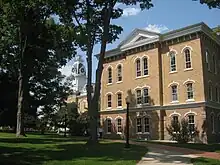
Hillsdale's 200-acre (81 ha) campus contains multiple instructional and office buildings, 13 residence halls, seven fraternity and sorority houses, an athletic complex, a library, a music hall, an arts center, a conference center, a hotel, and a preschool.[58] Hillsdale College also operates Hillsdale Academy, a private K–12 liberal arts school.[59] The college opened the classical-style Christ Chapel in 2019, in a dedication ceremony led by Supreme Court justice Clarence Thomas.[60]

The campus features the Liberty Walk, a walkway lined with bronze depictions of famous politicians including George Washington, Thomas Jefferson, Abraham Lincoln, Frederick Douglass, Winston Churchill, Margaret Thatcher, and Ronald Reagan.[3]
Policies
In the early 1980s a controversy over the school's admissions practices threatened federal student loans to 200 Hillsdale students. Title IX prohibits sex-based discrimination in any school or other education program that receives federal money. The federal government required colleges where students received federal funding to document their compliance with Title IX, but Hillsdale refused, arguing that the government could not deny federal funds to its students because the college received no direct federal funding and there was no allegation of actual sex discrimination.[61][62][63] The Department of Health, Education and Welfare (HEW) sought to terminate federal financial assistance to Hillsdale's students; an Administrative Law Judge (ALJ) denied HEW's request in 1978, and both HEW and Hillsdale appealed to HEW's Civil Rights Reviewing Authority.
In October 1979, the Reviewing Authority rejected Hillsdale's arguments and the ALJ's decision, ruling that HEW could require Hillsdale to sign the Assurance of Compliance as a condition of its students receiving federal financial assistance. The college appealed to the United States Court of Appeals for the Sixth Circuit; in 1982, the Sixth Circuit ruled that government aid to individual students could be terminated without a finding that a college actually discriminated, but nevertheless upheld Hillsdale's refusal to sign the compliance forms because only its student loan and grant program is subject to Title IX regulation, not the entire college.[61]
In the related 1984 case Grove City College v. Bell, the Supreme Court required every college or university to fulfill federal requirements – past and future requirements – if its students received federal aid.[64] As a result of the decision, Hillsdale withdrew from all federal assistance beginning with the 1984–1985 academic year; Grove City College, the plaintiff in that case, followed Hillsdale's lead four years later.[65] Beginning in the 2007–2008 academic year, Hillsdale stopped accepting Michigan state assistance, instead matching with its own aid any funds that a student would have received from the state.[66] Since 2007, Hillsdale's entire operating budget, including scholarships, has come from private funding and endowments.[67]
Programs
The Blake Center for Faith and Freedom
In 2019, S. Prestley Blake donated his estate in Somers, Connecticut, to the college. Following a lengthy battle over zoning issues,[68] the college has turned the estate into The Blake Center for Faith and Freedom.[69] The center includes a replica of Thomas Jefferson's Monticello.[70]
Academy for Science and Freedom
In December 2021, Hillsdale launched the Academy for Science and Freedom in response to the COVID-19 pandemic. The academy's stated goal is to "educate the American people about the free exchange of scientific ideas and the proper relationship between freedom and science in the pursuit of truth." The academy called the United States' response to the COVID-19 pandemic "the worst public health fiasco in history" that "has unveiled serious issues with how science is administered". Scott Atlas, Jay Bhattacharya, and Martin Kulldorff, who helped found the academy, have ties to the Great Barrington Declaration.[71]
Campus life
Athletics
In 2018, Hillsdale College was named one of the best schools in the U.S. for student-athletes by Next College Student Athlete's 2018 NCSA Power Rankings.[72] Hillsdale was the fourth ranked school among all NCAA Division II colleges and universities in the U.S.[73] The NCSA Power Rankings, which recognize the best colleges and universities in the U.S. for student-athletes, ranked Hillsdale within the top 10 among all Division II schools for several sports including football, baseball, softball, men's and women's basketball, men's and women's tennis, men's and women's track and field, women's swimming and women's volleyball. Hillsdale men's track and field also ranked 97th overall (among all divisions).[74]
Alma mater
Hillsdale's alma mater is "White and Blue". The words and melody were composed by Bess Hagaman Tefft, Class of 1937.[75]
Notable people
Notable alumni
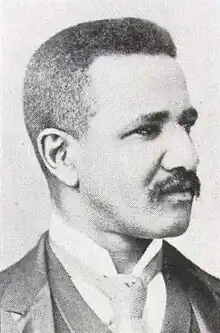
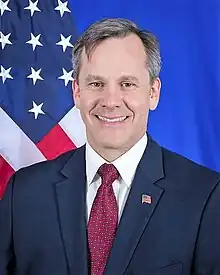

Politics and law
- E. Ross Adair (1929), member of the U.S. House of Representatives from Indiana
- Chester Hardy Aldrich (1888), Governor of Nebraska and justice on the Nebraska Supreme Court[76]
- Joseph Cella (1991), United States Ambassador to Fiji[77]
- Chris Chocola (1984), member of the U.S. House of Representatives from Indiana's 2nd congressional district and President of the Club for Growth[78]
- Cyrus Cline (1876), member of the U.S. House of Representatives from Indiana
- David L. Cornwell (1964), member of the U.S. House of Representatives from Indiana
- Dan Crane (1958), member of the U.S. House of Representatives from Illinois's 22nd and 19th congressional districts
- Phil Crane (1952), member of the U.S. House of Representatives from Illinois's 8th congressional district
- Robert William Davis (1952), member of the U.S. House of Representatives from Michigan's 11th congressional district
- Solomon Robert Dresser (1865), member of the U.S. House of Representatives from Pennsylvania and founder and president of S.R. Dresser Manufacturing Co., now Dresser Industries[79]
- Spencer O. Fisher (c. 1865), member of the U.S. House of Representatives from Michigan's 10th congressional district
- Albert J. Hopkins (1870), U.S. Senator from Illinois
- Henry M. Kimball (c. 1900), member of the U.S. House of Representatives from Michigan's 3rd congressional district
- Verner Main (1907), member of the U.S. House of Representatives from Michigan
- Spencer G. Millard (1877), Lieutenant Governor of California
- Joseph B. Moore (1879), justice on the Michigan Supreme Court
- Thomas Morrison (1997), representative for the 54th District in the Illinois General Assembly[80]
- Aric Nesbitt (2001), member of Michigan House of Representatives (2011–2017), 66th district and House Majority Floor Leader;[81] President Pro Tempore of the Michigan State Senate (2019–present)
- Walter H. North (1896), justice on the Michigan Supreme Court[82]
- Jasper Packard (c. 1853), newspaper editor and U.S. Representative from Indiana[83]
- Paul J. Ray, Administrator of the Office of Information and Regulatory Affairs
- David Viviano (1994), justice on the Michigan Supreme Court[84]
- Beth Walker (1987), justice of the West Virginia Supreme Court of Appeals
- Betsy Woodruff Swan (2012), reporter
- Hans Zeiger (2007), author and representative for the 25th Legislative District of Washington[85]
Military and public service
- Clinton B. Fisk (c. 1844), Civil War soldier and statesman, namesake of Fisk University and Prohibition Party candidate for president in 1888; first inductee into the Hillsdale County, Michigan Veteran's Hall of Fame in 2001[86]
- Mary Hannah Fulton (1874), medical missionary in China
- Washington Gardner (1870), Civil War soldier and statesman[87]
- Charles Vernon Gridley (c. 1860), Civil War sailor and Spanish–American War Naval captain
- Moses A. Luce (1866), lawyer and Medal of Honor recipient for service in the Civil War[88]
- Erik Prince (1992), Navy SEAL and founder of Blackwater
Science and engineering
- Bion J. Arnold, pioneer in electrical engineering and mass transportation
Professional sports and athletics
- Andre Holmes (2011), wide receiver for the Denver Broncos[89]
- Jared Veldheer (2010), offensive lineman for the Green Bay Packers[90]
- Tom Heckert (1990), former general manager for the Cleveland Browns[91]
- Spanky McFarland (1976), college baseball coach at Northern Illinois and James Madison
- Ron Tripp (c. 1975), expert in sambo and judo and current general secretary of USA Judo
- Chester Marcol (1972), placekicker for the Green Bay Packers and Houston Oilers
- Chuck Liebrock (1967), offensive lineman in the Canadian Football League for the Toronto Argonauts and Winnipeg Blue Bombers
- Bruce McLenna (1966), halfback for the Detroit Lions and Kansas City Chiefs
- Bud Acton (c. 1964), NBA player with the San Diego Rockets
- Howard Mudd (1963), offensive lineman for the San Francisco 49ers and Chicago Bears and offensive line coach for the Philadelphia Eagles
- Wayne Schurr (1959), relief pitcher for the Chicago Cubs
- Mike Lude (1948), head football coach at Colorado State University and athletic director at Kent State University, University of Washington, and Auburn University
- Fred Knorr (1937), radio executive and part-owner of the Detroit Tigers[92][93]
- Lynn Bell (1906), minor-league professional baseball player and college football coach
- Amanda Eccleston (2012), retired professional mid-distance runner for Brooks.
Academia and scholarship
- Manuel Ayau (1973), Guatemalan-born politician, humanitarian, and founder of the "Universidad Francisco Marroquín"[94]
- Clara Kern Bayliss (1871, 1874), first woman to graduate from Hillsdale, became writer, educator
- Elizebeth Friedman (1915), pioneer in cryptology
- Jason E. Hammond, Michigan Superintendent of Public Instruction[95]
- Peter Leeson (2001), economist[96]
- Robert P. Murphy (1998), economist and author[97]
- Gennady Stolyarov II (2008), libertarian and transhumanist writer
- Robert Page Sims (1897), college president, civil rights activist
- Kat Timpf (2010), Fox News contributor
Present faculty
- Michael Anton, former senior national security official in the Trump administration[98]
- Larry P. Arnn, educator and political scientist[99]
- Bradley J. Birzer, history professor and holder of the Russell Amos Kirk Chair in American Studies[100]
- Ronald J. Pestritto, graduate dean and professor of politics[101]
- Paul A. Rahe, historian
- Wilfred McClay, historian and author[102]
- Gary L. Wolfram, economist and public policy analyst[103]
- D. G. Hart, religious and social historian
- Mollie Hemingway, journalist[104]
Visiting faculty and fellows
- Victor Davis Hanson, classicist and war historian[105]
- Mark Helprin, novelist and intelligence expert[106]
- Carl F.H. Henry, theologian[105]
- David McCullough, historian[105]
- Madsen Pirie, British researcher, author, and educator[105]
- Mark Steyn, journalist[105]
- Clarence Thomas, Associate Justice of the Supreme Court of the United States[105]
Past faculty
- Michael Bauman, theologian[107]
- John Jay Butler, Free Will Baptist theologian
- Allan C. Carlson, historian[108]
- Ransom Dunn, dean and professor emeritus
- Clark Durant, educator, Senate candidate, co-founder of Cornerstone Schools (Michigan) and Imprimis
- Richard Ebeling, Austrian School economist[109]
- Burton Folsom, economic historian[110]
- Sir Martin Gilbert, official biographer of Winston Churchill and twentieth-century historian[105]
- Daniel McBride Graham, abolitionist, inventor
- Russell Kirk, conservative writer
- Madsen Pirie, British researcher and former visitor in philosophy and logic
- Frank "Muddy" Waters, College Football Hall of Fame inductee[111]
Notable trustees
- Pat Sajak, Wheel of Fortune host, President of the Hillsdale College Board of Trustees[112]
References
- "Endowment tops $900 million, with $600,000 per student". Hillsdale Collegian. Hillsdale College. September 2, 2021. Archived from the original on September 10, 2021. Retrieved September 10, 2021.
- "College Profile". Hillsdale College website. Hillsdale College. Archived from the original on September 5, 2015. Retrieved September 2, 2015.
- Eckholm, Erik (February 1, 2017). "In Hillsdale College, a 'Shining City on a Hill' for Conservatives". New York Times. Archived from the original on July 10, 2018. Retrieved July 9, 2018.
- Kruesi, Kimberlee (July 30, 2022). "Tennessee's embrace of Michigan's conservative Hillsdale College sours". The Detroit News. Archived from the original on April 11, 2023. Retrieved April 11, 2023.
- Ceballos, Ana (July 1, 2022). "Conservative Hillsdale College is helping DeSantis reshape Florida education". Tampa Bay Times. Archived from the original on April 11, 2023. Retrieved April 11, 2023.
- Moore, Vivian Elsie Lyon (1944). The First Hundred Years of Hillsdale College. Ann Arbor, Michigan: The Ann Arbor Press. OCLC 4819396. 588 pp.
- Lloyd, Alice (May 12, 2018). "The College That Wants to Take Over Washington". POLITICO Magazine. Archived from the original on September 9, 2023. Retrieved May 29, 2023.
- Anderson, Nick; Douglas-Gabriel, Danielle (December 15, 2017). "Hillsdale College, subject of Senate debate, is known for rejecting federal funds". Washington Post. ISSN 0190-8286. Archived from the original on May 14, 2018. Retrieved May 14, 2018.
- Gilbert, Arlan K. (1991). Historic Hillsdale College: Pioneer in Higher Education, 1844–1900. Hillsdale, Michigan: Hillsdale College Press. p. 274. ISBN 978-0916308797. OCLC 24636032.
- "Hillsdale College: Past Presidents". Archived from the original on June 24, 2013. Retrieved December 23, 2010.
- Vedder, Henry Clay (1897). A Short History of the Baptists. American Baptist Publication Society. p. 273. Retrieved December 23, 2010.
- Hoplin, Nicole; Robinson, Ron (2008). Funding Fathers: The Unsung Heroes of the Conservative Movement. Simon and Schuster. ISBN 978-1596985629. Archived from the original on September 9, 2023. Retrieved August 27, 2014 – via Google Books.
- Irene Harwarth; Mindi Maline; Elizabeth DeBra. "Women's Colleges in the United States: History, Issues, and Challenges". United States Department of Education, National Institute on Postsecondary Education, Libraries, and Lifelong Learning. Archived from the original on June 14, 2010. Retrieved December 23, 2010.
- "History – Spring Arbor Township". Archived from the original on November 17, 2014. Retrieved September 18, 2014.
- "Dr. E. B. Fairfield Dead" (PDF). New York Times. November 19, 1904. Archived (PDF) from the original on August 28, 2021. Retrieved June 13, 2018.
- "Birth of the Republican Party". NY Times. July 7, 1879. Archived from the original on September 9, 2023. Retrieved March 9, 2023.
- Guidelines Regarding the Mission and Moral Commitments of Hillsdale College Archived March 30, 2018, at the Wayback Machine July 2010
- Dan Bisher (1999). "A Brief History of Hillsdale County, Pioneer Period: 1825–1843". Archived from the original on September 28, 2013. Retrieved September 26, 2013.
- Gilbert, Arlan K. (1994). Hillsdale Honor: The Civil War Experience. Hillsdale, Michigan: Hillsdale College Press. ISBN 978-0916308728. OCLC 29816536. 88 pp.
- "George Frank Mosher; Former Consul at Nice, Educator and Bay State Legislator Dies". New York Times. November 19, 1904. Archived from the original on October 3, 2013. Retrieved December 23, 2010.
- "Lives of the Founders and Builders of Hillsdale College". google.com. 1885. Archived from the original on September 9, 2023. Retrieved March 10, 2015.
- Gilbert, Arlan K. (1998). The Permanent Things: Hillsdale College 1900–1994. Hillsdale, Michigan: Hillsdale College Press. ISBN 978-0916308629. OCLC 39113606. 320 pp.
- "Leading Men Take Up the Question of Women's Right to Vote" (PDF). New York Times. December 20, 1908. Archived (PDF) from the original on August 29, 2021. Retrieved December 23, 2010.
- "George Dr. Joseph Mauck, educator, Was 84". New York Times. July 8, 1937. Archived from the original on September 28, 2013. Retrieved December 23, 2010.
- "Spencer Heads Franklin College". New York Times. March 31, 1933. Archived from the original on July 23, 2018. Retrieved December 23, 2010.
- Mullins, Julia (January 24, 2019). "'Unpredictable Timeline' for Naming New Dorm". Hillsdale Collegian. Archived from the original on January 13, 2023. Retrieved January 13, 2023.
- "Hillsdale College Athletics". hillsdalechargers.com. Archived from the original on April 14, 2015. Retrieved April 13, 2015.
- "College History/Past Presidents – Hillsdale College". hillsdale.edu. Archived from the original on March 16, 2015. Retrieved April 13, 2015.
- "Michigan Historical Markers – Hillsdale College". www.hmdb.org. Historical Marker Data Base. Archived from the original on August 4, 2022. Retrieved August 4, 2022.
- Ellis, Jonathan (January 19, 2000). "Sex, lies and suicide". Salon. Archived from the original on November 15, 2014. Retrieved September 15, 2014.
- Miller, John (November 12, 1999). "Horror at Hillsdale". National Review. Archived from the original on June 12, 2019. Retrieved August 9, 2018.
- Claiborne, William (November 13, 1999). "Controversy Builds as College Chief Quits". Washington Post. Archived from the original on September 9, 2023. Retrieved July 31, 2023.
- Meredith, Robyn (November 15, 1999). "Scandal Rocks a Conservative Campus". New York Times. Archived from the original on July 23, 2017. Retrieved February 8, 2017.
- "National News Briefs; Conservative College Names New President". New York Times. April 7, 2000. Archived from the original on April 8, 2016. Retrieved February 26, 2011.
- Saul, Stephanie (April 10, 2022). "A College Fights 'Leftist Academics' by Expanding Into Charter Schools". New York Times. Archived from the original on January 13, 2023. Retrieved January 13, 2023.
- Strauss, Valerie (July 30, 2022). "How Hillsdale College-affiliated charter schools spread". The Washington Post. Archived from the original on August 15, 2022. Retrieved January 13, 2023.
- "Mission and History". Hillsdale in DC. Archived from the original on January 13, 2023. Retrieved January 13, 2023.
- Toobin, Jeffrey (August 22, 2011). "Partners". The New Yorker. Retrieved June 25, 2022.
- "Boyle Radio Studio". Hillsdale in DC. Archived from the original on January 13, 2023. Retrieved January 13, 2023.
- "The Van Andel Graduate School of Statesmanship". Hillsdale College. Archived from the original on September 28, 2022. Retrieved January 13, 2023.
- Dodge, Samuel (September 22, 2019). "Hillsdale College establishes D.C.-based Graduate School of Government". Michigan Live. Archived from the original on January 13, 2023. Retrieved January 13, 2023.
- "Graduate School of Classical Education". Hillsdale College. Archived from the original on March 11, 2023. Retrieved January 13, 2023.
- Klein, Rebecca (August 1, 2013). "Hillsdale College President Larry Arnn Under Fire For Calling Minority Students 'Dark Ones'". Huffington Post. Archived from the original on February 20, 2019. Retrieved February 20, 2020.
- "Mich. college president calls minorities 'dark ones'". USA Today. Archived from the original on December 4, 2017. Retrieved December 4, 2017.
- "Statement from House Democratic Leader Tim Greimel (D-Auburn Hills) on Hillsdale College President Larry Arnn's racist remarks: | Michigan House Democratic Caucus". Housedems.com. July 31, 2013. Archived from the original on January 7, 2014. Retrieved August 27, 2014.
- Higgins, Lori; Jesse, David (August 1, 2013). "Hillsdale president get heat over racial remark". Detroit Free Press. Archived from the original on September 5, 2013. Retrieved September 26, 2013.
No offense was intended by the use of that term except to the offending bureaucrats, and Dr. Arnn is sorry if such offense was honestly taken. But the greater concern, he believes, is the state-endorsed racism the story illustrates.
- "Blake Center for Faith and Freedom Hosts First Event". Hillsdale College. Archived from the original on August 17, 2021. Retrieved August 17, 2021.
- "All about Hillsdale College's plan to build a campus near Roseville". abc10.com. January 27, 2022. Archived from the original on October 30, 2022. Retrieved October 30, 2022.
- "A conspiracy-peddling college is coming to Placer County. That should scare us all". MSN. Archived from the original on October 30, 2022. Retrieved October 30, 2022.
- "See drone video of proposed Hillsdale College site in Placer County". Sacramento Bee. January 23, 2022. Archived from the original on January 26, 2022. Retrieved October 30, 2022.
Drone video from January 2022 shows the planned site west of Roseville for a college campus built by Michigan's conservative Hillsdale College on land once owned by the family of Sacramento developer Angelo Tsakopoulos.
- Kingkade, Tyler (July 20, 2023). "Conservatives are changing K-12 education, and one Christian college is at the center". NBC News. Archived from the original on July 20, 2023. Retrieved July 20, 2023.
- "Hillsdale College". U.S. News & World Report Best Colleges. 2019. Archived from the original on September 5, 2015. Retrieved November 29, 2018.
- "The Best 384 Colleges". Archived from the original on September 28, 2022. Retrieved September 28, 2022.(registration required)
- "Hillsdale College". nces.ed.gov. U.S. Dept of Education. Archived from the original on January 21, 2023. Retrieved January 21, 2023.
- "Home". gradschool.hillsdale.edu. Archived from the original on September 28, 2022. Retrieved September 28, 2022.
- "Program Overview". dc.hillsdale.edu. Archived from the original on September 28, 2022. Retrieved September 28, 2022.
- "Graduate School of Education | Hillsdale College". classicalgrad.hillsdale.edu. Archived from the original on March 11, 2023. Retrieved September 28, 2022.
- "Hillsdale College: About Hillsdale". Archived from the original on June 13, 2013. Retrieved April 15, 2011.
- "Hillsdale Academy". Archived from the original on September 29, 2013. Retrieved December 23, 2010.
- Nester, Alex (October 3, 2019). "Clarence Thomas salutes 'faith' at Hillsdale College chapel dedication". The Detroit News. Archived from the original on September 9, 2023. Retrieved November 1, 2022.
- Hillsdale College v. Department of Health, Education and Welfare, 696 F.2d 418 (United States Court of Appeals for the Sixth Circuit 7 December 1981).
- Glenn M. Wong (2010). Essentials of Sports Law. Bloomsbury Academic. p. 340. ISBN 978-0313356759. Archived from the original on September 9, 2023. Retrieved August 9, 2016.
- Maeroff, Gene I. (September 6, 1977). "Colleges in Conflict over Federal Role". The New York Times. Archived from the original on April 10, 2023. Retrieved February 12, 2021.
Hillsdale College in Michigan has steadfastly refused to agree to indicate it will comply with a 1972 education law that denies Federal funding to any college or university that discriminates by sex.
- Grove City College v. Bell, 465 U.S. 555 (Supreme Court of the United States 28 February 1984).
- Caputo, Ibby; Marcus, Jon (July 7, 2016). "The Controversial Reason Some Religious Colleges Forgo Federal Funding". The Atlantic. Archived from the original on March 30, 2020. Retrieved April 1, 2020.
- "Hillsdale rejects Michigan grants". The Detroit News. August 14, 2007.
- "Hillsdale College replaces state scholarship aid with private funds". Diverse: Issues in Higher Education. Associated Press. August 13, 2007. Archived from the original on September 9, 2023. Retrieved February 12, 2021.
- "How the coming of a conservative Midwestern college divided a small CT town". August 26, 2020. Archived from the original on August 17, 2021. Retrieved August 17, 2021.
- "The Blake Center for Faith and Freedom | Hillsdale College". www.blakecenterproject.org. Archived from the original on December 22, 2021. Retrieved August 17, 2021.
- Inquirer, Jackie Nappoand Matthew P. Knox Journal (February 8, 2019). "New use for Monticello? Co-founder of Friendly's, wife propose satellite college in Somers". Journal Inquirer. Archived from the original on August 17, 2021. Retrieved August 17, 2021.
- Bragman, Walker; Kotch, Alex (December 22, 2021). "How the Koch Network Is Spreading COVID Misinformation". Jacobin. Archived from the original on January 8, 2022. Retrieved January 8, 2022.
- "Top US Athletic And Academic Universities". Archived from the original on February 9, 2019. Retrieved February 15, 2019.
- "Best NCAA Division 2 Colleges". Archived from the original on March 27, 2019. Retrieved February 15, 2019.
- "Best Men's Track and Field Colleges". Archived from the original on February 21, 2019. Retrieved February 15, 2019.
- "College History/Alma Mater – Hillsdale College". Hillsdale.edu. June 23, 2014. Archived from the original on November 21, 2011. Retrieved August 27, 2014.
- "Nebraska Governor Chester Hardy Aldrich". National Governors Association. Archived from the original on September 11, 2017. Retrieved September 16, 2012.
- "Ambassador Joseph J. Cella". U.S. Embassy in Fiji, Kiribati, Nauru, Tonga, and Tuvalu. Archived from the original on April 9, 2020. Retrieved April 26, 2020.
- "Why the Club for Growth Is Changing Leadership". www.nationaljournal.com. Archived from the original on December 13, 2014. Retrieved June 9, 2015.
- "Dresser, Solomon Robert – Biographical Information". congress.gov. Archived from the original on October 17, 2015. Retrieved June 9, 2015.
- "Illinois State Representative Thomas Morrison". repmorrison54.com. Archived from the original on November 7, 2013. Retrieved June 9, 2015.
- "Aric Nesbitt, District 66". Michigan House Republicans. February 5, 2015. Archived from the original on December 1, 2016. Retrieved June 9, 2015.
- "The Honorable Walter Harper North". University of Michigan Law School. Archived from the original on May 1, 2015. Retrieved April 13, 2011.
- Commission, Michigan Historical (1907). Michigan Historical Collections. Vol. 6. Archived from the original on September 9, 2023. Retrieved October 25, 2020.
- "David Viviano". ballotpedia.org. Archived from the original on July 10, 2015. Retrieved June 9, 2015.
- "Hans Zeiger". Washington State House Republicans. Archived from the original on June 18, 2015. Retrieved June 9, 2015.
- College), Amphictyon Society (Hillsdale (1890). "History of the Amphictyon Society of Hillsdale College, Hillsdale, Michigan". google.com. Archived from the original on September 9, 2023. Retrieved October 25, 2020.
- "Gardner, Washington – Biographical Information". congress.gov. Archived from the original on October 17, 2015. Retrieved June 15, 2015.
- "Pvt Moses Augustine Luce". aotw.org. Archived from the original on September 8, 2015. Retrieved June 15, 2015.
- "Andre Holmes". NFL.com. Archived from the original on May 21, 2015. Retrieved June 9, 2015.
- "Jared Veldheer". NFL.com. Archived from the original on June 1, 2015. Retrieved June 9, 2015.
- Nate Ulrich. "Game day for Browns GM Tom Heckert". www.ohio.com. Archived from the original on October 17, 2015. Retrieved June 9, 2015.
- "Radio station owner brought British Invasion to Metro airwaves" (PDF). Detroitmemories.com. Archived (PDF) from the original on March 4, 2016. Retrieved August 9, 2016.
- "Detroit Local News – Michigan News". The Detroit News. Archived from the original on January 30, 2023. Retrieved July 30, 2022.
- "Brief Biography". ufm.edu. Archived from the original on June 19, 2015. Retrieved June 9, 2015.
- Fuller, George Newman (1924). An Account of Ingham County from Its Organization. pp. 498–499. Archived from the original on January 7, 2023. Retrieved January 18, 2023.
- "Peter T. Leeson". Cato Unbound. Archived from the original on September 7, 2015. Retrieved June 9, 2015.
- "Robert P. Murphy". DeSmogBlog. Archived from the original on July 3, 2015. Retrieved June 9, 2015.
- "The End of Conservatism and the Rebirth of Politics". Archived from the original on November 2, 2018. Retrieved November 29, 2018.
- "Hillsdale College – Faculty Profile". Archived from the original on May 22, 2013. Retrieved June 5, 2013.
- "Brad Birzer". Hillsdale College. Archived from the original on May 13, 2019. Retrieved July 20, 2018.
- "Ronald J. Pestritto". Hillsdale College. Archived from the original on February 19, 2018. Retrieved February 18, 2018.
- "Wilfred McClay to join Hillsdale history faculty". November 19, 2020. Archived from the original on November 28, 2021. Retrieved May 19, 2022.
- "Dr. Gary L. Wolfram". mackinac.org. Archived from the original on January 3, 2015. Retrieved March 10, 2015.
- "How Hillsdale College helps journalism by hiring Mollie Hemingway". April 25, 2019. Archived from the original on November 28, 2019. Retrieved November 28, 2019.
- "Academics/Programs/Visiting Fellows – Hillsdale College". hillsdale.edu. Archived from the original on June 14, 2013. Retrieved March 10, 2015.
- "Hillsdale College – Department-Sponsored Speakers". Archived from the original on May 28, 2010. Retrieved April 29, 2010.
- "Hillsdale College – Faculty Profile". Archived from the original on May 28, 2010. Retrieved February 2, 2010.
- "Hillsdale College – Faculty Profile". Archived from the original on May 28, 2010. Retrieved February 2, 2010.
- "Richard Ebeling: Short Biography". Archived from the original on June 12, 2010. Retrieved April 29, 2010.
- "Hillsdale College – Faculty Profile". Archived from the original on October 15, 2009. Retrieved February 2, 2010.
- "College Football Hall of Fame || Famer Search". Archived from the original on July 24, 2012.
- Peterson, Kyle (September 25, 2015). "The Conservative Wheelman". Wall Street Journal. Archived from the original on November 30, 2020. Retrieved December 2, 2019.
External links
- Official website
- The Hillsdale Collegian, the campus newspaper
.jpg.webp)
